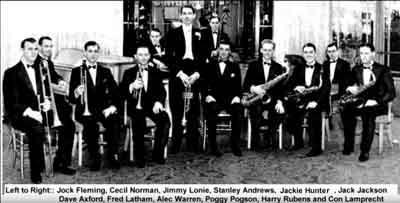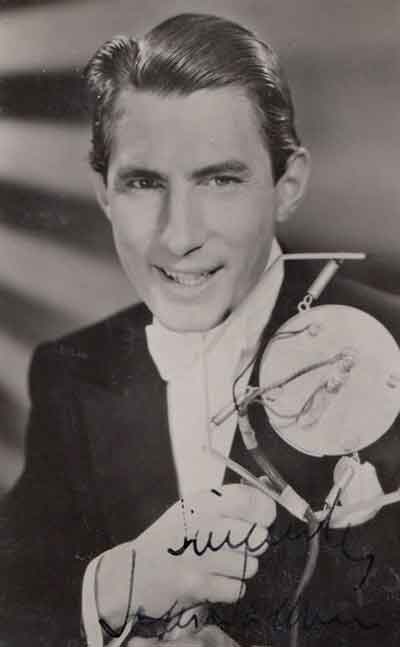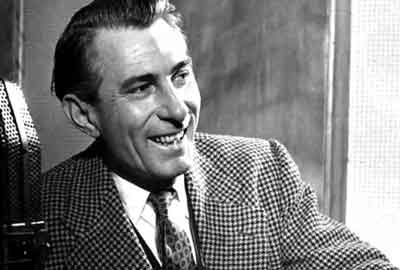JACK JACKSON: (20 February 1906 Barnsley, Yorkshire – 15 January 1978 Rickmansworth)
“Hello record lovers everywhere and welcome to the show”
During the 1920’s and 1930’s British dance band era, Jack Jackson was an English trumpeter, multi-instrumentalist and bandleader. He later became a highly influential radio disc jockey. The BBC’s nickname “Auntie” is often credited to Jackson.
Being the son of a brass band player and conductor, he began playing cornet at the age of 11. He learned the violin and cello before studying at the Royal Academy of Music where he learnt to play trumpet. He then played in dance bands, circuses, revues, ballrooms and ocean liners.
TIMELINE:
- 1926: Jack Jackson joined Bert Railton’s Havana Band and went on a three-month tour of southern Africa, starting at Cape Town in October.” In January 1927 they were in Rhodesia (Zimbabwe); they played in Salisbury (Harare) then stayed on for a hunting picnic party. Unfortunately Bert Ralton was shot in the leg and died the next day.” The band completed the tour being led by saxophonist Bill Barton before returning to England in June 1927.
- 1927: He joined Jack Hylton’s band playing lead trumpet and singing scat. During this time, he also played in numerous bands and studio orchestras. He left Hylton in November 1929.
- 1929-30: Jack briefly playing with the Howard Jacobs band before moving to the Savoy Hotel and a band lead by Percival Mackey who was then replaced by Arthur Lally. He also recorded and did freelance work with the likes of Harry Hudson, Ray Noble and Roy Fox.
- 1931: He joined Jack Payne and the BBC Dance Orchestra staying till 1933
- 1933-1938 Jack formed his own band; Jack Jackson and his Orchestra and started a five-year residency at the Dorchester Hotel in London. His signature tune was his own composition “Make Those People Sway”.
- 1938- 1940: The Jack Jackson band moved to Rector’s Club and then in March 1940 to the Mayfair Hotel. In 1939 he also had a regular radio show on Radio Luxembourg where his humorous personality made the shows hugely popular.
- During the war, Jack Jackson joined the “Ministry of Information and was tasked with drawing cartoons for pamphlets, he was also working as a booking agent at Foster’s Agency”.
- 1947: He briefly made a comeback with a new band at Churchill’s, followed with playing with his own band at the Potomac in October 1947. ”It was after this engagement that Jack gave up band-leading after he received an offer from the BBC to compare a BBC big-band series of programs called Band Parade and Jazz Club”.
- June 1948-1955: Jack Jackson became a household name with his own hugely successful late night show, Record Round Up where he interjected sound effects and humour in between the music. He was regularly voted top DJ.
- 1955: Jack moved to commercial television. His was the first voice heard on ITV’s opening night. The show was basically Record Roundup with pictures.
- 1959-1977: He returned to the BBC in 1959 and by 1962 had settled into a prime Saturday lunchtime slot for his Record Roundabout programme. Technology had now moved to magnetic tape making it easier to splice together sound effects and snippets of comedy clips from the likes of Tony Hancock, Steptoe & Son and The Goon Show
- 1962: Jack Jackson left England to live in the Canary Islands. “He built himself a sophisticated and technically advanced studio where he would record his radio shows and the recordings were sent by jet plane each week to London.”
- 1973: At the age of 67 Jack became quite ill, so he returned to England.
- 1975: Jack recovered and presented a new radio show called, The Jack Jackson Show.
The Bowlly connection:
- Between December 1930 to May 1931: Jack played trumpet and joined vocal choruses and “Scat” on several sided by The New Mayfair Dance Orchestra, Roy Fox and his Band and the Radio Rhythm Boys
- February 1st 1933: Jack recorded two rejected sided as John Jackson and His Orchestra. These have not been found. This session is entered in the HMV files as by `Mr. Blunt and his Orchestra
- February 24th 1933: Four tracks were recorded and released as by John Jackson and His Orchestra.



